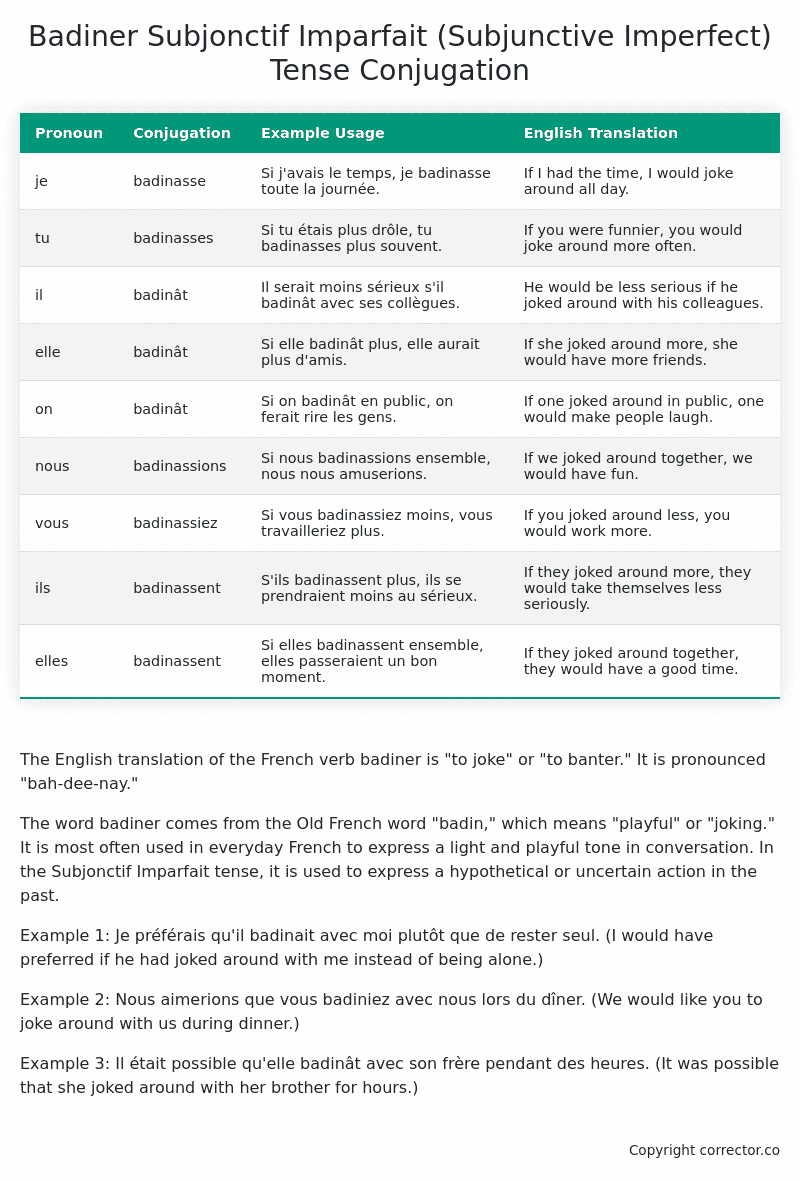Subjonctif Imparfait (Subjunctive Imperfect) Tense Conjugation of the French Verb badiner
Introduction to the verb badiner
The English translation of the French verb badiner is “to joke” or “to banter.” It is pronounced “bah-dee-nay.”
The word badiner comes from the Old French word “badin,” which means “playful” or “joking.” It is most often used in everyday French to express a light and playful tone in conversation. In the Subjonctif Imparfait tense, it is used to express a hypothetical or uncertain action in the past.
Example 1: Je préférais qu’il badinait avec moi plutôt que de rester seul. (I would have preferred if he had joked around with me instead of being alone.)
Example 2: Nous aimerions que vous badiniez avec nous lors du dîner. (We would like you to joke around with us during dinner.)
Example 3: Il était possible qu’elle badinât avec son frère pendant des heures. (It was possible that she joked around with her brother for hours.)
Table of the Subjonctif Imparfait (Subjunctive Imperfect) Tense Conjugation of badiner
| Pronoun | Conjugation | Example Usage | English Translation |
|---|---|---|---|
| je | badinasse | Si j’avais le temps, je badinasse toute la journée. | If I had the time, I would joke around all day. |
| tu | badinasses | Si tu étais plus drôle, tu badinasses plus souvent. | If you were funnier, you would joke around more often. |
| il | badinât | Il serait moins sérieux s’il badinât avec ses collègues. | He would be less serious if he joked around with his colleagues. |
| elle | badinât | Si elle badinât plus, elle aurait plus d’amis. | If she joked around more, she would have more friends. |
| on | badinât | Si on badinât en public, on ferait rire les gens. | If one joked around in public, one would make people laugh. |
| nous | badinassions | Si nous badinassions ensemble, nous nous amuserions. | If we joked around together, we would have fun. |
| vous | badinassiez | Si vous badinassiez moins, vous travailleriez plus. | If you joked around less, you would work more. |
| ils | badinassent | S’ils badinassent plus, ils se prendraient moins au sérieux. | If they joked around more, they would take themselves less seriously. |
| elles | badinassent | Si elles badinassent ensemble, elles passeraient un bon moment. | If they joked around together, they would have a good time. |
Other Conjugations for Badiner.
Le Present (Present Tense) Conjugation of the French Verb badiner
Imparfait (Imperfect) Tense Conjugation of the French Verb badiner
Passé Simple (Simple Past) Tense Conjugation of the French Verb badiner
Passé Composé (Present Perfect) Tense Conjugation of the French Verb badiner
Futur Simple (Simple Future) Tense Conjugation of the French Verb badiner
Futur Proche (Near Future) Tense Conjugation of the French Verb badiner
Plus-que-parfait (Pluperfect) Tense Conjugation of the French Verb badiner
Passé Antérieur (Past Anterior) Tense Conjugation of the French Verb badiner
Futur Antérieur (Future Anterior) Tense Conjugation of the French Verb badiner
Subjonctif Présent (Subjunctive Present) Tense Conjugation of the French Verb badiner
Subjonctif Passé (Subjunctive Past) Tense Conjugation of the French Verb badiner
Subjonctif Imparfait (Subjunctive Imperfect) Tense Conjugation of the French Verb badiner (this article)
Subjonctif Plus-que-parfait (Subjunctive Pluperfect) Tense Conjugation of the French Verb badiner
Conditionnel Présent (Conditional Present) Tense Conjugation of the French Verb badiner
Conditionnel Passé (Conditional Past) Tense Conjugation of the French Verb badiner
L’impératif Présent (Imperative Present) Tense Conjugation of the French Verb badiner
L’infinitif Présent (Infinitive Present) Tense Conjugation of the French Verb badiner
Struggling with French verbs or the language in general? Why not use our free French Grammar Checker – no registration required!
Get a FREE Download Study Sheet of this Conjugation 🔥
Simply right click the image below, click “save image” and get your free reference for the badiner Subjonctif Imparfait tense conjugation!

Badiner – About the French Subjonctif Imparfait (Subjunctive Imperfect) Tense
Formation
Common Everyday Usage Patterns
Interactions with Other Tenses
Subjonctif Présent
Indicatif Passé Composé
Conditional
Conditional Perfect
Summary
I hope you enjoyed this article on the verb badiner. Still in a learning mood? Check out another TOTALLY random French verb conjugation!


